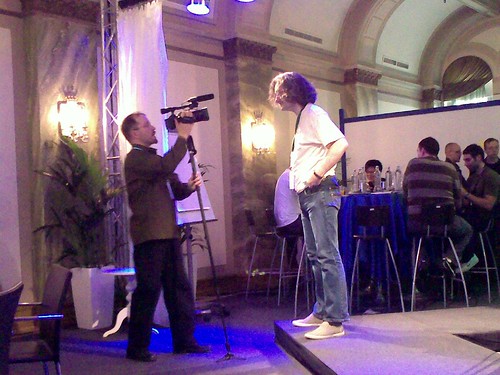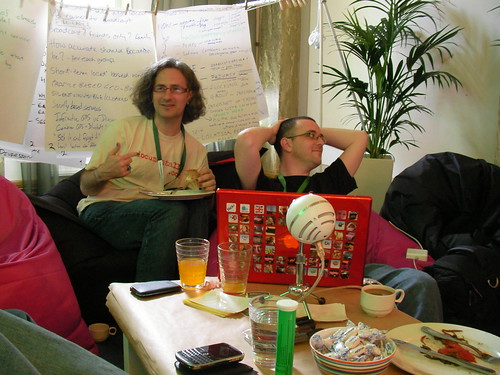 I’ve just spent 3 days geeking out in Helsinki, at the Nokia Open Lab 08. The idea was to bring together 40 social media/mobile tech/blogging geeks in Helsinki for a series of workshops, discussions, talks and brainy mash-ups. The attendees were from all kinds of backgrounds, from corporate bloggers writing about tech stuff or financial markets, to sub-cultural social media conduits, using mobile technology to bring communities together and subvert standard media channels.
I’ve just spent 3 days geeking out in Helsinki, at the Nokia Open Lab 08. The idea was to bring together 40 social media/mobile tech/blogging geeks in Helsinki for a series of workshops, discussions, talks and brainy mash-ups. The attendees were from all kinds of backgrounds, from corporate bloggers writing about tech stuff or financial markets, to sub-cultural social media conduits, using mobile technology to bring communities together and subvert standard media channels.
The format was really interesting, in that we were kind of thrown together with very little context, and left to work out what people’s areas of expertise were based on what they were willing/pushy enough to say in each of the discussions. So those of us who are extroverts naturally spoke at greater length than our respective knowledge bases necessarily warranted. Still, much value came out of the discussions, and a lot of people seem to have been fired up to use social media applications that they’d signed up for months ago but never really found a use for.
From Nokia’s side, they got
- a massive amount of internal and external marketing footage from the conference
- a load of online content bigging up their products
- some quality, focussed expert product and service feedback
- a whole bunch of enthusiastic interaction with some of their technology’s most progressive early adopters.
I’ll hopefully write up a lot of what I thought about the conference, but I think I’ll actually start at the end, with what the whole thing meant for musicians:
It was really interesting to be brought in by a mega transnational corporation to discuss mobile technology, given that my focus is largely empowering creatives to create without recourse to the corporate world – I’m not a fan of ad-sponsored music promotion streams and clearly not into the big record label model of yore. So in a sense there was some bravery in Nokia inviting people like me in without any kind of NDA/Contractual obligation not to slam their very existence (like anyone would really give a shit if I did… but anyway…).
As a pragmatist, I liked being in a place where for a weekend, I could largely think about ‘the best we can do within this kind of corporate framework’ – what does a company like Nokia have to offer the world of creativity and progressive political interaction by way of infrastructure and support? How can we as creatives use this technology, and perhaps even work with Nokia, in promoting a culture of un-fettered art. What can they do to help?
In approaching it from that angle, there were quite a few frustrations – the biggest being the session on the ‘future of entertainment’ – the scene was set by Anne Toole, talking from her background as a very experienced ‘old media’ writer (TV/film), now moved into the games industry. She talked a lot about her notion of what ‘film’ is – I think the idea was to get us thinking conceptually about the future of ‘The Industry’ in whatever our group were going to be discussing.
However, for me, the start point would have been the antithesis of what she was saying – I would have blown the doors off any attempt to define ‘film’ beyond it being ‘a series of pictures projected as a fast enough rate as to give the appearance of motion’, and then got people to think about the deep stuff of how we can make the world of film – both that which is designed to ‘entertain’ but also the information/pure art end of the spectrum – more interesting, more engaging, more productive, more subversive, more enjoyable, through social media and mobile technology.
But the big problem wasn’t that I disagreed with what I thought she was saying, it’s that she had no way of knowing I was thinking that and therefor couldn’t clarify whether or not I’d got completely the wrong end of the stick. So problem #1 was the format of the ‘presentation’ part, not the content (disagreement is vital to progressive discussion, but it has to be open and ‘real time’…)
Problem #2 was the way we were divided up. There were four groups – music, film, games and ‘me media’ (me media being cleverly named, given Nokia’s latest ad campaign… 😉 ) – and we were arbitrarily assigned to them. We could have swapped. I could’ve just wandered over to the music camp, but I didn’t. I was stuck in the games group. I don’t think it’s any surprise to anyone that I effing hate games. Actually no, not games, I hate Games. I play games all the time – twitter, facebook, myspace, who’s going to fill the dishwasher. All fun, exciting, enjoyable games. I just couldn’t give a shit about the Games Industry.
I am however innately curious, and fairly good at conceptual abstraction, so we managed to have a cool discussion about games, gaming, and game principles abstracted from game culture. But still, there was a discussion about the future of the music industry and its relationship with social media/mob-tech, and I WASN’T IN IT.
W. T. F?
Yup, my fault for not getting up and moving. But their fault for not facilitating a coming together of people with expertise in the area. I would have LOVED to bang heads with the guys from the Nokia music store (not launched yet), to chat with people who see music as part of the ‘entertainment industry’, to people who favour ad-revenue models for ‘feels like free’ music. I’ve got about 150,000 words of stuff written on the subject 🙂
And we did have those conversations – that was the strength of the conference. As with all conferences, the conversations after the sessions were the main course. the sessions were largely high-functioning ice-breakers. The magic of Nokia Open Lab 08 started at 3pm on Saturday after the closing speech.
So post #2 will start to look at what we covered in the rest of the sessions, and where we go from here. Or maybe that’ll be post #3. Or #4… 😉
 So, following up my thoughts about the ‘future of business‘, where I touched on this idea of collaboration between groups of experts as the way forward, where everyone has an investment in what goes on, everyone has a say within their group etc…
So, following up my thoughts about the ‘future of business‘, where I touched on this idea of collaboration between groups of experts as the way forward, where everyone has an investment in what goes on, everyone has a say within their group etc…
 Session 3 (session 2 for me) was the Entertainment one outlined in
Session 3 (session 2 for me) was the Entertainment one outlined in  So the format of the Friday was intro, followed by four sessions –
So the format of the Friday was intro, followed by four sessions – I’ve just spent 3 days geeking out in Helsinki, at the
I’ve just spent 3 days geeking out in Helsinki, at the